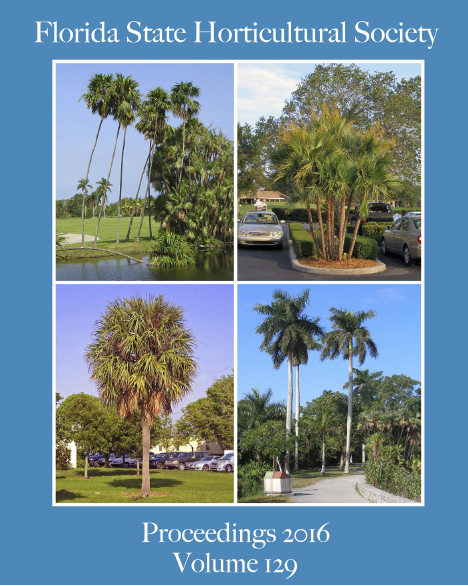The Use of Smart Phone Application (SmartIrrigation Vegetable) for Irrigation Scheduling in Tomato (Solanum Lycopersicon) Production
Abstract
A study that focused on irrigation scheduling methods and rates for open-field tomato (Solanum Lycopersicon) production was conducted at the University of Florida/IFAS Southwest Research and Education Center (SWFREC), Immokalee, FL. The study was carried out during spring and fall seasons of 2015. The main objective was to evaluate use of a smart phone application (SmartIrrigation Vegetable) on tomato productivity and water-use in comparison to University of Florida IFAS (UF/IFAS) irrigation recommendations. Five irrigation rates (66% App, 100% App, 150% App, 66% UF/IFAS and 100% UF/IFAS) were evaluated in a randomized complete-block design with four replicates per treatment. Plant biomass samples were taken at 30, 60, and 90 days after transplanting (DAT) and harvests were conducted at fruit maturity. For both seasons, no significant difference was observed in dry biomass accumulation for 100% App and 100% IFAS at 60 and 90 DAT but a significant increase in dry biomass accumulation was observed for 100% App (266 lb/acre) compare to 100% IFAS (217 lbs.acre-1) at 30 DAT (P = 0.002) during spring season. No significant dif-ference was observed in marketable yield among treatments during the spring season as a result of bacterial leaf spot and blossom-end rot. However, a significant increase in average marketable yield (41%) was observed for 100% App compared with 100% IFAS (P = 0.03) during the fall season. The low App rate (66% App) was the most water efficient (50 gallons/box of marketable fruit) but yield was lower than 100% App. Water use efficiency (WUE) for 100% App was greater (67 gallons/box) compared with 100% IFAS (111 gallons/box) during the fall season. These results suggest that the SmartIrrigation vegetable (SI) app can be successfully used for irrigation scheduling in tomato production in Florida. Also, SI App can increase WUE by increasing water savings in tomato production and as a result can reduce nutrient leaching and increase yield.

